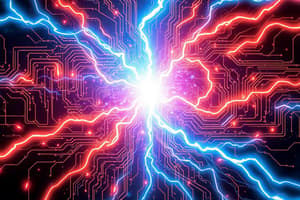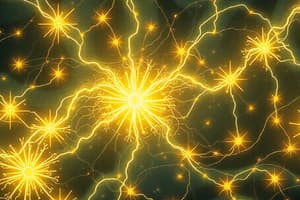Podcast
Questions and Answers
What is the primary function of direct current generators?
What is the primary function of direct current generators?
- Store electrical energy for later use
- Furnish electric energy for various systems including elevators (correct)
- Convert electrical energy to mechanical energy
- Change voltage levels from higher to lower
How do motors function in the context of energy conversion?
How do motors function in the context of energy conversion?
- Convert mechanical energy into electrical energy
- Convert electrical energy to mechanical energy (correct)
- Furnish electric energy for signal systems
- Transform one voltage level to another
What is the purpose of a step-up transformer?
What is the purpose of a step-up transformer?
- Provide electric energy directly to machine components
- Convert physical signals into electrical signals
- Decrease voltage from high to low
- Increase voltage from low to high (correct)
Which type of transformer is oil-insulated?
Which type of transformer is oil-insulated?
In the context of electrical systems, what is not a primary function of transformers?
In the context of electrical systems, what is not a primary function of transformers?
Which of the following is NOT a source of electricity?
Which of the following is NOT a source of electricity?
What defines dynamic electricity?
What defines dynamic electricity?
What happens as soon as the parts of a primary battery are assembled?
What happens as soon as the parts of a primary battery are assembled?
Who is recognized as the 'Father of Electricity'?
Who is recognized as the 'Father of Electricity'?
What is the significance of electric current traveling at the speed of light?
What is the significance of electric current traveling at the speed of light?
Which of the following correctly identifies a characteristic of static electricity?
Which of the following correctly identifies a characteristic of static electricity?
Which component is essential for the functional operation of a primary battery?
Which component is essential for the functional operation of a primary battery?
What is an electric cell primarily responsible for?
What is an electric cell primarily responsible for?
What is primary about primary batteries?
What is primary about primary batteries?
What is the primary function of secondary batteries?
What is the primary function of secondary batteries?
Which of the following systems primarily uses secondary batteries?
Which of the following systems primarily uses secondary batteries?
What is the main function of an alternator?
What is the main function of an alternator?
Which type of energy is most widely used today?
Which type of energy is most widely used today?
What is a common application of secondary batteries?
What is a common application of secondary batteries?
Which of the following does NOT describe the function of a generator?
Which of the following does NOT describe the function of a generator?
In what aspect does the bulk of electrical energy utilized today differ from earlier sources?
In what aspect does the bulk of electrical energy utilized today differ from earlier sources?
Flashcards are hidden until you start studying
Study Notes
Direct Current Generators
- Supply electric energy for elevators, intercommunication telephone systems, signal control systems, and clock systems.
- Utilize motor-generator sets and starter panels in their operation.
Dynamo Electric Machines
- Motors: Convert electrical energy into mechanical energy. They are fundamental components in various electrical systems.
- Transformers: Change voltage levels; step-up transformers increase voltage, while step-down transformers decrease it.
- Types of transformers include oil-insulated transformers and dry type transformers.
Electricity Overview
- Defined as energy generated through friction, induction, or chemical change, characterized by magnetic, chemical, and radiant effects.
- Electric current consists of the motion of free electrons within conductors and travels at the speed of light.
Key Historical Figure
- William Gilbert, known as the "Father of Electricity," studied electric attraction and electric force. He contributed to understanding the nature of electric charges in atoms.
Types of Electricity
- Dynamic Electricity (Electrodynamic): Flows through substances as an electric current.
- Static Electricity (Electrostatic): Accumulates and does not flow.
Sources of Electricity
- Batteries: Comprise two or more electric cells for storing and supplying direct current via electrochemical means.
- Primary Batteries: Deliver electricity immediately upon assembly when connected to a circuit.
- Secondary/Storage Batteries: Require an external source to charge before delivering electric current. Commonly used for emergency circuits and alarm systems.
Generators
- Convert mechanical energy into electrical energy.
- Alternating Current Generators (Alternators): Most widely used for electrical energy, essential for powering modern lighting and electrical systems.
Studying That Suits You
Use AI to generate personalized quizzes and flashcards to suit your learning preferences.




